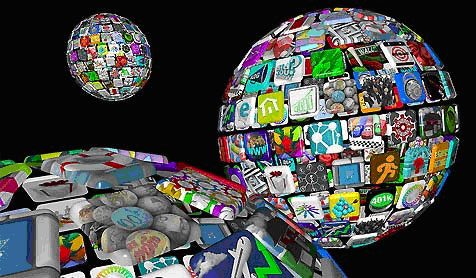The APProach to problem solving
Need garden planning help? There’s a landscaping app for you. Having trouble getting pregnant? There’s an app to monitor your bodily cycles. Allergic to certain foods and have trouble eating out? There’s a device that can scan your food and an app that analyzes your results. Whether you are trying to avoid speed traps or keep track of employee work hours, or find what sort of tequila best matches your personal preferences—chances are there is an app (or two) for just about everything.

Image source: Fotolia
Apps were a booming business rocketing skywards in 2013, with the global app economy valued at $68 bn., and predicted to double by 2016. Devices of all sorts, from handsets to food scanners to cameras, ride piggyback on apps or require the use of apps as the “internet of things” universe expands. With about 1.6 million apps in the App Store and Play Store alone, such growth can only continue to profoundly influence the ways in which we spend our time, buy our phones, use computing devices, communicate with friends, and more.
About all this, there is much industry buzz if not outright euphoria. What is far less in the news is what all these interactions with applications and devices may be doing to funnel our approaches to problem-solving. For example: with the right devices and the right apps, I can monitor my food intake with considerable precision, I can make dietary changes in accordance with my needs, I can even perhaps monitor the presence of pesticides or other chemicals in my food. Apps and the algorithms they marshal allow me to think of my problems at an individual level, and provide me with some motivation (if not the means) by which to solve them. They do not, however, encourage me to think about problems at a systemic level, or to consider big picture scenarios. How should the food industry be regulated so that there’s better quality food being produced for everybody? How do we ensure a food supply for the world’s poor?
This condition is what the writer Evgeny Morozov calls “technological solutionism”: placing such faith in technologies such that available tech tools both determine what problems we decide to address, and how we go about addressing them. Apps tend to regulate users instead of industries—so not only do the scales of our problem-solving change, we also tend to forget all but the problems that our tech tools can address.
Of course, the idea that we, as human beings, would use available tools and technologies to solve our problems is of course nothing new. Nor would this be the first time that we have been swayed by the promise and hype of science and technology, throwing in our lot with them. What is different this time, according to Morozov, is that we have a new “problem-solving infrastructure,” thanks to the proliferation of sensors, the expansion of social networking, portable computing and so on. These things enable and connect us as never before; they make real what never seemed possible; they bring us that much closer to the sci-fi worlds of our wildest dreams. What’s more, these technologies are participatory, they engage us and involve us, in ways that other promissory futurist sciences such as genomics never could. Who wouldn’t like that?
Morozov is not suggesting that our sensors and apps and social networks cannot be useful. What he is suggesting is that their utility comes at a price which is very easy to ignore, amidst all the hype—and that price is privatization. This means two things. First, that it’s the commercial for-profit tech companies, far more than government or public agencies, who are entrusted with identifying our biggest problems and the means by which to solve them. Second, we look at problems via our individual devices and apps, as private issues to be solved at an individual level. By metering our water or monitoring our energy consumption or using gamified approaches to recycling, we may make some lifestyle changes—even significant, meaningful ones. But it is unlikely that we will be compelled to confront the stark realities of global warming or income and health disparities. Apps and smart devices are simply not designed to seek radical systemic change, even while they allow us to visualize our individual selves in bigger pictures.
I’d like, on some level, to believe that the right apps in each person’s hands would eventually raise consciousness about issues in a way that brings about changes on littler and bigger scales. But all I need to do is look around my neighborhood in Pondicherry to realize that human needs run the gamut from basic to complex/actualizing, and that problems like obesity or garbage or environmental pollution require not just individualized efforts but also infrastructure, industry regulation, and good governance.
What I take away from Morozov is the need to remember that while technology enables much, it also generates a sort of forgetfulness of the elemental nature of human needs and the complex scales of human problems. Last I checked, there wasn’t really an app to fix that.
Tags: Evgeny Morozov, technological solutionism, apps, big questions


